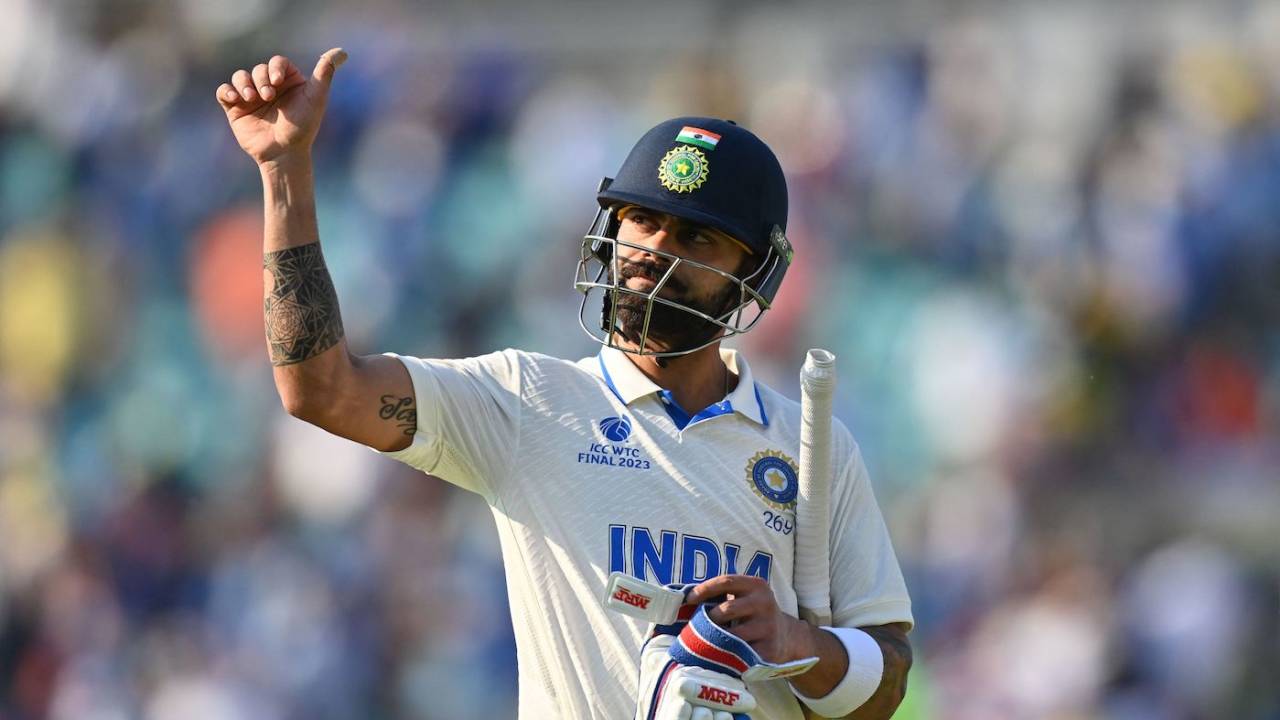Kohli, Rahane keep India alive in hunt of 444
Earlier, Carey’s 66* allowed Australia to declare on 270 for 8

India 296 and 164 for 3 (Kohli 44*, Rohit 43) need another 280 runs to beat Australia 469 and 270 for 8 dec (Carey 66, Labuschagne 41, Starc 41, Jadeja 3-58, Shami 2-39, Umesh 2-54)
Under bright skies and on an Oval pitch that seemed to ease out against all expectations, India’s batters set up a potentially thrilling final day, racing to 164 for 3 at more than four an over to keep alive their pursuit of a world-record fourth-innings target. Australia remain favourites, with India needing a further 280 on the final day, but they may have a lot of hard work ahead of them to take the seven remaining wickets, with the second new ball 40 overs away.
India may have still felt a little cross with themselves at stumps, though, losing perhaps a wicket more than they would have liked by then, two of them to aggressive shots. Rohit Sharma was lbw to Nathan Lyon, missing a sweep from a stump-to-stump line, and Cheteshwar Pujara toe-ended an attempted ramp over the slips off a Pat Cummins bouncer.
Both batters will argue, though, that these are shots they usually play well. They will also argue that the same positivity had helped them stitch a second-wicket stand of 51 in 77 balls. The two wickets, however, fell in the space of five balls, turning 92 for 1 to 93 for 3.
It was the perfect opening for Australia to bulldoze through, but Virat Kohli and Ajinkya Rahane were having none of it. They ended the day reprising the same positivity that had gone before, putting on an unbroken 71 for the fourth wicket, with both batters looking in excellent ball-striking rhythm. Conditions, too, didn’t seem to test them, with the pitch showing far less tendency to produce inconsistent bounce than it had done through the first three innings of the match. Kohli and Rahane ended the day with control percentages of 93 and 97 respectively.
As they safely negotiated the last over of the day, a largely India-supporting crowd was in fine voice, a section of them belting out this number from the 1975 blockbuster Sholay: “yeh dosti, hum nahin todenge [we’ll never break this friendship].” Australia will want to break it as soon as possible when day five dawns.
The crowd had been far less pleased some two hours earlier, though, after India lost their first wicket off what ended up as the last ball before tea, following a near-run-a-ball opening partnership of 41. Scott Boland got one to straighten and kick in the corridor, Shubman Gill pushed at it with hard hands, and Cameron Green dived low to his left to pluck out a superlative gully catch, his second of the match. Gill stood his ground, though, and the decision went up to the third umpire. As is often the case with these low grabs, replays seemed inconclusive, but the decision went in Australia’s favour.
Chants of “Cheat! Cheat! Cheat!” continued to follow Green through the rest of the evening, particularly when he bowled. A World Test Championship that had been full of quality cricket now had the one ingredient it had been missing: controversy and needle.
Was Green’s catch to dismiss Gill clean?
During the first session of the day, Green had had a far different effect on the crowd, keeping them quiet as he added 18 runs in 87 balls to his overnight score of 7. His dismissal was in keeping with the tone of his innings: he attempted to pad away a Ravindra Jadeja delivery from over the wicket only for the ball to hit his pad and roll onto the wicket.
By then, Australia had added 44 to their overnight 123 for 4 while losing two wickets in 19 overs – Marnus Labuschagne the other batter dismissed, nicking Umesh Yadav to first slip. India had bowled with discipline while extracting just enough from the surface to keep the batters vigilant; with Australia’s lead just 340, they may have hoped to wrap their innings up before it got to 400.
Alex Carey, however, ensured that it swelled well beyond that figure, scoring an opportunistic 66 to go with his 48 in the first innings, and putting on 93 for the seventh wicket with Mitchell Starc. Both batters began cautiously and had their moments of discomfort, particularly against Jadeja finding sharp turn and bounce from the footmarks outside the left-handers’ off stump, but grew increasingly confident as India’s quicks tired.
Mohammed Shami, who had bowled frugally and beaten the bat multiple times without any reward in his previous spells, came back when India took the second new ball and dismissed Starc and Pat Cummins when they were looking to slog for quick runs. Australia declared at the stroke of Cummins’ dismissal, setting India a never-before-achieved 444 to win.
It may have been a nostalgia-inducing moment among old-timers at the ground. In 1979, a Sunil Gavaskar double-hundred had inspired India to a thrilling draw at The Oval; they finished on 429 for 8 after being set 438 by England. There’s still a chance that Sunday may bring similar levels of excitement.







